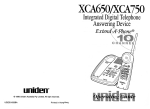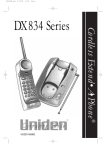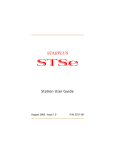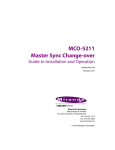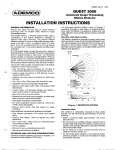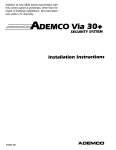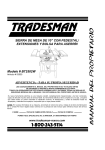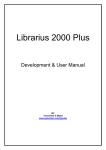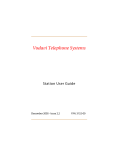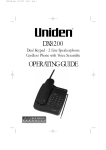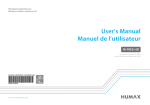Download Uniden CLX 465 Cordless Telephone User Manual
Transcript
CONTENTS 1 Handset Controls and Keys ......................................................................................................... 2 Base Unit Controls and Keys ....................................................................................................... 3 Important Safety Instructions ...................................................................................................... 4 Battery Safety Precautions ..................................................................................................... 4 Important Notes ..................................................................................................................... 5 Introduction ................................................................................................................................. 5 Features ................................................................................................................................. 6 Included with the XCAI680 .......................................................................................................... 7 Important Electrical Considerations ............................................................................................ 7 Range .................................................................................................................................... 7 Telephone Line Problems ....................................................................................................... 7 Radio Interference .................................................................................................................. 7 More Than One Cordless Telephone ...................................................................................... a ................................................................................................................................... Installation a Selecting a Location ............................................................................................................... 6 Telephone Line Outlets.. ......................................................................................................... 9 ............................................................................................. Connecting the Telephone Cord 9 Applying Power to the Base Unit ............................................................................................ 10 Desk or Tabletop Installation ................................................................................................ 12 Direct Wall Mounting ............................................................................................................ 16 .............................................................................................................. Setting Up Your Phone 16 Extending the Base Unit Antenna ........................................................................................ 16 ..................................................................................... Installing the Handset Battery Pack 18 ............................................................................................. Cleaning the Battery Contacts 19 ................................................................................................... Charging the Battery Pack 19 Low Battery Indicator ........................................................................................................... 20 .............................................................................................. Setting the Pulse/Tone Switch 21 Handset Volume Controls ..................................................................................................... 22 Automatic Digital Code Security ........................................................................................... 25 Setting Caller ID on Call Waiting .......................................................................................... 26 Setting the AutoTalk Feature ................................................................................................ 26 Setting the Caller ID Name Tagging Feature ........................................................................ 26 Setting the Caller ID Number Grouping Feature .................................................................. 29 Using Your Phone ...................................................................................................................... 29 Making Calls ......................................................................................................................... 30 Receiving Calls .................................................................................................................... 31 Using Call Waiting Feature ................................................................................................... 32 Redialing the Last Number Called ........................................................................................ 33 Using the Flash Key with Call Waiting .................................................................................. 33 Using the Page/Find Feature ................................................................................................ 33 Automatic Channel Scan Feature ......................................................................................... Channel Button .................................................................................................................... 33 33 Speakerphone ...................................................................................................................... Using Caller ID .......................................................................................................................... 34 34 The Caller ID Display ........................................................................................................... 34 Viewing Calls in Memory ...................................................................................................... 35 Calling the Displayed Number .............................................................................................. 35 Deleting Caller ID message ................................................................................................. 36 Programming Your Phone . . . . . . . . . . . .~ . . . . . . . . . . . . . . . . . . . . . . . . . . . . . . . . . . . . . . . . . . . . . . . . . . . . . . . . . . . . . . . . . . . . . . . . . . . . . . . . . . . . . . . . . . . . . Storing a Caller ID memory number in Dial Memory . . . . . . . . . . . . . . . . . . . . . . . . . . . . . . . . . . . . . . . . . . . . . . . . . . . . . . . . . . . . 36 Storing a Regular Number in Dial Memory . . . . . . . . . . . . . . . . . . . . . . . . . . . . . . . . . . . . . . . . . . . . . . . . . . . . . . . . . . . . . . . . . . . . . . . . . . 36 Calling a Number Stored in Memory . . . . . . . . . . . . . . . . . . . . . . . . . . . . . . . . . . . . . . . . . . . . . . . . . . . . . . . . . . . . . . . ... . . . . . . . . . . . . . . . . . 38 Editing and Deleting Numbers in Dial Memory . . . . . . . . . . . . . . . . . . . . . . . . . . . . . . . . . . . . . . . . . . . . . . . . . . . . . . . . . . . . . . . . . . . . . 38 The Integrated Answering System . . . . . . . . . . . . . . . . . . . . . . . . . . . . . . . . . . . . . . . . . . . . . . . . . . . . . . . . . . . . . . . . . . . . . . . . . . . . . . . . . . . . . . . . . . . . 40 Features . . . . . . . . . . . . . . . . . . . . . . . . . . . . . . . . . . . . . . . . . . . . . . . . . . . . . . . . . . . . . . . . . . . . . . . . . . . . . . . . . . . . . . . . . . . . . . . . . . . . . . . . . . . . . . . . . . . . . . . . ....... 40 Answering System Setup . . . . . . . . . . . . . . . . . . . . . . . . . . . . . . . . . . . . . . . . . . . . . . . . . . . . . . . . . . . . . . . . . . . . . . . . . . . . . . . . . . . . . . . . . . . . . . . . . . . . . . . . . . 41 Turning the Answering System On/Off . . . . . . . . . . . . . . . . . . . . . . . . . . . . . . . . . . . . . . . . . . . . . . . . . . . . . . . . . . . . . . . . . . . . . . . . . . . . . . . . . 41 Setting the Clock and PIN Code . . . . . . . . . . . . . . . . . . . . . . . . . . . . . . . . . . . . . . . . . . . . . . . . . . . . . . . . . . . . . . . . . . . . . . . . . . . . . . . . . . . . . . . . . . . 41 Reviewing Time and Day Stamp . . . . . . . . . . . . . . . . . . . . . . . . . . . . . . . . . . . . . . . . . . . . . . . . . . . . . . . . . . . . . . . . . . . . . . . . . . . . . . . . . . . . . . . . . . 42 42 Setting Your Outgoing Message (OGM) . . . . . . . . . . . . . . . . . . . . . . . . . . . . . . . . . . . . . . . . . . . . . . . . . . . . . . . . . . . . . . . . . . . . . . . . . . . . . . . Recording Your Personal OGM . . . . . . . . . . . . . . . . . . . . . . . . . . . . . . . . . . . . . . . . . . . . . . . . . . . . . . . . . . . . . . . . . . . . . . . . . . . . . . . . . . . . . . . . . . . . .43 43 Selecting a Preset OGM . . . . . . . . . . . . . . . . . . . . . . . . . . . . . . . . . . . . . . . . . . . . . . . . . . . . . . . . . . . . . . . . . . . . . . . . . . . . . . . . . . . . . . . . . . . . . . . . . . . . . . 44 Auto Disconnect . . . . . . . . . . . . . . . . . . . . . . . . . . . . . . . . . . . . . . . . . . . . . . . . . . . . . . . . . . . . . . . . . . . . . . . . . . . . . . . . . . . . . . . . . . . . . . . . . . . . . . . . . . . . . . . . . . . Setting the Toll Saver Switch . . . . . . . . . . . . . . . . . . . , . . . . . . . . . . . . . . . . . . . . . . . . . . . . . . . . . . . . . . . . . . . . . . . . . . . . . . . . . . . . . . . . . . . . . . . . . . . . 44 45 Using the Reset Button . . . . . . . . . . . . . . . . . . . . . . . . . . . . . . . . . . . . . . . . . . . . . . . . . . . . . . . . . . . . . . . . . . . . . . . . . . . . . . . . . . . . . . . . . . . . . . . . . . . . . . . . . Using Your Answering System . . . . . . . . . . . . . . . . . . . . . . . . . . . . . . . . . . . . . . . . . . . . . . . . . . . . . . . . . . . . . . . . . . . . . . . . . . . . . . . . . . . . . . . . . . . . . . . . . .46 46 Playing New Messages . . . . . . . . . . . . . . . . . . . . . . . . . . . . . . . . . . . . . . . . . . . . . . . . . . . . . . . . . . . . . . . . . . . . . . . . . . . . . . . . . . . . . . . . . . . . . . . . . . . . . . . . Playing a Stored Message . . . . . . . . . . . . . . . . . . . . . . . . . . . . . . . . . . . . . . . . . . . . . . . . . . . . . . . . . . . . . . . . . . . . . . . . . . . . . . . . . . . . . . . . . . . . . . . . . . . 47 47 Repeating a Message . . . . . . . . . . . . . . . . . . . . . . . . . . . . . . . . . . . . . . . . . . . . . . . . . . . . . . . . . . . . . . . . . . . . . . . . . . . . . . . . . . . . . . . . . . . . . . . . . . . . . . . . . . .. Skipping a Message . . . . . . . . . . . . . . . . . . . . . . . . . . . . . . . . . . . . . . . . . . . . . . . . . . . . . . . . . . . . . . . . . . . . . . . . . . . . . . . . . . . . . . . . . . . . . . . . . . . . . . . . . . .48 Deleting a Message . . . . . . . . . . . . . . . . . . . . . . . . . . . . . . . . . . . . . . . . . . . . . . . . . . . . . . . . . . . . . . . . . . . . . . . . . . . . . . . . . . . . . . . . . . . . . . . . . . . . . . . . . . . . . 49 Deleting All Messages . . . . . . . . . . . . . . . . . . . . . . . . . . . . . . . . . . . . . . . . . . . . . . . . . . . . . . . . . . . . . . . . . . . . . . . . . . . . . . . . . . . . . . . . . . . . . . . . . . . . . . . 50 ... Message Full Indication . . . . . . . . . . . . . . . . . . . . . . . . . . . . . . . . . . . . . . . . . . . . . . . . . . . . . . . . . . . . . . . . . . . . . . . . . . . . . . . . . . . . . . . . . . . . . . . . . . . . . . . 51 Leaving a Memo Message . . . . . . . . . . . . . . . . . . . . . . . . . . . . . . . . . . . . . . . . . . . . . . . . . . . . . . . . . . . . . . . . . . . . . . . . . . . . . . . . . . . . . . . . . . . . . . . . . . . 51 Screening Incoming Calls . . . . . . . . . . . . . . . . . . . . . . . . . . . . . . . . . . . . . . . . . . . . . . . . . . . . . . . . . . . . . . . . . . . . . . . . . . . . . . . . . . . . . . . . . . . . . . . . . . . . 52 Remote Operation . . . . . . . . . . . . . . . . . . . . . . . . . . . . . . . . . . . . . . . . . . . . . . . . . . . . . . . . . . . . . . . . . . . . . . . . . . . . . . . . . . . . . . . . . . . . . . . . . . . . . . . . . . . . . . . . . . . . . 53 Using a Touch-Tone Phone . . . . . . . . . . . . . . . . . . . . . . . . . . . . . . . . . . . . . . . . . . . . . . . . . . . . . . . . . . . . . . . . . . . . . . . . . . . . . . . . . . . . . . . . . . . . . . . . . . 53 Troubleshooting . . . . . . . . . . . . . . . . . . . . . . . . . . . . . . . . . . . . . . . . . . . *. . . . . . . . . . . . . . . . . . . . . . . . . . . . . . . . . . . . . . . . . . . . . . . . . . . . . . . . . . . . . . . . . . . . . . . . . . . . . 54 Telephone Troubleshooting Chart . . . . . . . . . . . . . . . . . . . . . . . . . . . . . . . . . . . . . . . . . . . . . . . . . . . . . . . . . . . . . . . . . . . . . . . . . . . . . . . . . . . . . . . . .54 Answering System Troubleshooting Chart . . . . . . . . . . . . . . . . . . . . . . . . . . . . . . . . . . . . . . . . . . . . . . . . . . . . . . . . . . . . . . . . . . . . . . . . . . . 5 .5 Caller ID Troubleshooting Chart . . . . . . . . . . . . . . . . . . . . . . . . . . . . . . . . . . . . . . . . . . . . . . . . . . . . . . . . . . . . . . . . . . . . . . . . . . . . . . . . . . . . . . . . . . . 56 Specifications . . . . . . . . . . . . . . . . . . . . . . . . . . . . . . . . . . . . . . . . . . . . . . . . . . . . . . . . . . . . . . . . . . . . . . . . . . . . . . . . . . . . . . . . . . . . . . . . . . . . . . . . . . . . . . . . . . . . . . . . .... 57 Handset Controls and Keys 1. LCD Display 2. talk Key 3. Numeric Keypad 4. flash/function Key 5. redial/pause Key 6. caller id/c wait Key 7. mem Key 8. channel/delete Key 9. volume/cancel Key 10. Microphone a 000 1 000 6 7 2 000 L 0knd.A.Phone l# CwnEl fJL TMCLEAR uw 3 4 8 5 9 ~0000000~ L 1 Base Unit Controls and Keys 1 2 3 4 5 67 89 11 18 20 21 23 1. Base Ringer Volume Switch 2. Pulse/Tone Switch 3. DC Power Jack 4. Telephone Line Jack 5. Handset Retainer 6. New Message Button 7. Speakerphone Button and LED 6. Speaker 9. Message Counter LED 10. Speaker Volume Control Button 11. In Use LED 12. Ring Time 2-4-TS Switch 13. Record Time/Ann/4/1 Switch 14. Message Repeat Button 15. Message Skip Button 16. Message Play Button 17. Page/Find Button 18. Microphone 19. Message Delete Button 20. Outgoing Message Button 21. Memo Button 22. Stop Button 23. Answer On/Off Button Important Safety Instructions When using your telephone equipment, these basic safety precautions should always be followed to reduce the risk of fire, electrical shock, and injury to persons: 1. Read and understand all instructions. 2. Follow all warnings and instructions marked on the product. 3. Unplug this product from the wall outlet before cleaning, and use a dry cloth, without liquid or aerosol cleaners. 4. Do not use this product near water; for example, near a bath tub, wash bowl, kitchen sink or laundry tub, in a wet basement, or near a swimming pool. 5. Do not place this product on an unstable cart, stand, or table. The telephone may fall, causing serious damage to the unit. 6. Slots and openings in the cabinet and the back or bottom are provided for ventilation. To protect the product from overheating, these openings must not be blocked or covered.This product should never be placed near or over a radiator or heat register. This product should not be placed in a built-in installation unless proper ventilation is provided. 7. This product should be operated only from the type of power source indicated on the marking label. If you are not sure of the type of power supply to your home, consult your dealer or local power company. 8. Do not allow anything to rest on the power cord. Do not locate this product where the cord will be damaged by persons walking on it. 9. Do not overload wall outlets and extension cords, as this can result in the risk of fire or electrical shock. 10 Never push objects of any kind into this product through cabinet slots, as they may touch dangerous voltage points or short out parts that could result in a risk of fire or electric shock. Never spill liquid of any kind on the product. 11 To reduce the risk of electric shock, do not disassemble this product. Take it to qualified service personnel when service or repair work is required. Opening or removing covers may expose you to dangerous voltages or other risks. Incorrect reassembly can cause electric shock when the appliance is subsequently used. 12. Unplug this product from the wall outlet and refer servicing to qualified service personnel under the following conditions: A. When the power supply cord is damaged or frayed. B. If liquid has been spilled into the product. C. If the product has been exposed to rain or water. D. If the product does not operate normally when following the operating instructions. (Adjust only those controls that are covered by the operating instructions. Improper adjustment of other controls may result in damage and will often require extensive repair work by a qualified technician.) E. If the product has been dropped or the cabinet has been damaged. F. If the product exhibits a distinct change in performance. 13. Do not use the telephone to report a gas leak in the vicinity of the leak. 3 Battery Safety Precautions Caution: To reduce the risk of fire or injury to persons by the battery read and follow these instructions: 1. Use only the appropriate type and size Battery Pack specified in this Operating Guide. 2. Do not dispose of the Battery Pack in a fire. The cell may explode. 3. Do not open or mutilate the Battery Pack. Released electrolyte is corrosive and may cause damage to the eyes or skin. It may be toxic if swallowed. 4. Exercise care in handling the battery in order not to short the battery with conducting materials such as rings, bracelets, and keys. The battery or conductor may overheat and cause burns. 5. Charge the Battery Pack provided with or identified for use with this product only in accordance with the instructions and limitations specified in the instruction manual provided for this product. 6. Observe proper polarity orientation between the Battery Pack and battery charger, Privacy - Cordless telephones are radio devices. Communications between the handset and base of your cordless telephone are accomplished by means of radio waves which are broadcast over the open airways. Because of the inherent physical properties of radio waves, your communications can be received by radio receiving devices other than your own telephone unit. Consequently, any communications using your cordless telephone may not be private. Important Notes l l l To make use of the Caller Display Features of this phone; you must subscribe to your telephone service provider’s Caller Display Service. This model has been specifically designed for the Australian market. This XCAI680 can display both the name and number of the calling party. However at this time, Telstra is not forwarding the name. This feature may be available in the future. l Each telephone device that you connect draws power from the phone line. We refer to the power drawn as the device’s Ringer Equivalence Number or REN. The REN is shown on the bottom of your telephone. If you are using more than one phone or other device on the line, add up all the RENs. If the total is more than 3, your phones might not ring. In rural areas, a total REN of three might impair ringing operation. PLEASE SAVE THESE INSTRUCTIONS 4 Introduction Congratulations on your purchase of the Uniden XCAI680 Cordless Telephone with Digital Answering System and Caller Display. This phone is designed to exacting standards which provide reliability, long life, and outstanding performance. Features 10 Channels AutoTalk™ l AutoStandby™ l Speakerphone l Pulse/Tone Dialing 9 20-Number Memory Random C o d e ™ Digital Security UltraClear Plus l AutoSecure™ l Page/Find Button l Base/Handset Volume Controls l 14 Day Battery Life 30 Number Caller ID Memory Automatic Channel Scanning l 20 Minutes Digital Record Time l Call Waiting Compatible l Caller ID Name Tagging l l l l l l AutoTalk™ allows you to answer a call by just removing the Handset from the Base so you don’t have to waste time pushing buttons or flipping switches. AutoStandby™ allows you to hang up by simply returning the Handset to the Base. The UltrClear Plus innovative technology, together with 10 different channels, virtually eliminates background noise and provides you with the best possible reception during all of your conversations. To help protect you against misbilled calls which might result from your phone being activated by other equipment, Random Code™ digital security automatically selects one of over 65 thousand digital security codes for the Handset and Base Units. Also, the AutoSecure™ feature electronically locks your phone when the Handset is on the Base. To get the most from your phone, please read this Operating Guide thoroughly. Visit our we6 site for more information on the Uniden product range. http:www.uniden.com.au 5 Included with the XCAl680 If any of these items are missing or damaged, contact the place of purchase. Handset Two Mounting Screws Base Unit Rechargeable Battery Part # CTA885 Telephone Cord for Australia Remote Access Memo Cards AC Adapter (AAD-650U) Operating Guide Memo Paper - -----~-Registration Card Quick Start Guide Important Notice. 6 Important Electrical Considerations Unplug all electrical appliances when you know an electrical storm is approaching. Lightning can pass through your household wiring and damage any device connected to it. This phone is no exception. Warning: Please do not attempt to unplug any appliance during an electrical storm. Caution: I Changes or modifications to this product not expressly approved by Uniden. or operation of this product in any way other than as detailed by this Operating Guide, could void your authority to operate this product. Range Your new phone is designed to achieve the maximum possible range by transmitting and receiving according to the highest specifications. We have rated this phone to operate at a maximum distance with the qualification that the range depends upon the environment in which the telephone is used. Many factors limit range, and it would be impossible to include all the variables in our rating. The Maximum Range rating of this phone is meant to be used as a means of comparison against other range claims. Telephone Line Problems If you are having trouble with your telephone service, you must first disconnect your phone to determine if it is the cause of your problem. If you determine that it is the cause, you must leave it disconnected until the trouble has been corrected. Radio Interference Radio interference may occasionally cause buzzing and humming in your cordless Handset, or clicking noises in the Base Unit. This interference is caused by external sources such as TV, refrigerator, vacuum cleaner, fluorescent lighting, or electrical storm. Your unit is NOT DEFECTIVE. If these noises continue and are too distracting, please check around your home to see what appliances may be causing the problem. In addition, we recommend that the Base not be plugged into a circuit that also powers a major appliance because of the potential for interference. Be certain that the antenna on the unit is fully extended. In the unlikely event that you consistently hear other voices or distracting transmissions on your phone, you may be receiving radio signals from another cordless telephone or other source of interference. If you cannot eliminate this type of interference, press the channel key to select a channel that provides the clearest communication. Finally, it should be noted that some cordless telephones operate at frequencies that may cause interference to nearby TVs and VCRs. To minimise or prevent such interference, the base of the cordless telephone should not be placed near or on top of a TV or VCR. If interference is experienced, moving the cordless telephone farther away from the TV or VCR will often reduce or eliminate the interference. More Than One Cordless Telephone If you want to use more than one cordless telephone in your home, they must operate on different channels. Press the channel key to select a channel that provides the clearest communication. Installation Selecting a Location Before choosing a location for your new phone, there are some important guidelines you should consider: l The location should be close to both a phone jack and continuous power outlet. Note: Make sure that the AC outlet is switched on for continuous power supply Keep the Base Unit and Handset away from sources of electrical noise such as motors or fluorescent lighting. Be sure there is sufficient space to fully extend the Base Unit antenna. The Base Unit can be placed on a desk or tabletop or wall mounted. If you decide to mount your phone on the wall, make sure to change the Handset Retainer so that the tab which holds the Handset faces up. (See page 14 for more information.) You should charge your new phone for 15-20 hours before completing the installation or using the Handset. Telephone Line Outlets Modular Jack Most phone equipment available now uses modular jacks. Phone cords are fitted with a molded plastic connector which plugs into this type of jack. If you do not have modular phone jacks, contact your local telephone company for information about their installation. Connecting the Telephone Cord Consider these safety guidelines before connecting the telephone cord: CAUTION: l l l Never install telephone wiring during a lightning storm. Never touch uninsulated telephone wires or terminals unless the telephone line has been disconnected. Use caution when installing or modifying telephone lines. Applying Power to the Base Unit All the XCAI680 phones require an AC outlet and the included AC Adapter. To relieve strain on the DC plug when the phone is placed on a desk or table, connect the adapter as shown below. Wrap the power cord around the convenient notch on the bottom. important: Place the power cord so that it does not create a trip hazard, or where it could become chafed and create a fire or other electrical hazards. 9 Desk or Tabletop Installation 1. Place the Base on a desk or tabletop. 2. Plug one end of the telephone cord into the TEL LINE jack on the Base Unit. 10 1 4 3. Plug the AC Adapter cord into the 9V DC input jack on the Base Unit. 4. Place the AC Adapter cord around the strain relief. 5. Plug the other end of the telephone cord into the telephone jack on the wall. 6. Plug the AC Adapter into a standard 230-240V AC wall outlet and make sure it is switched on. ! Use only the Uniden AC Adapter supplied with this phone. 11 Direct Wall Mounting You can mount your phone directly on a wall. Before mounting your phone, consider the following: l l l Select a location away from electrical cables, pipes, or other items behind the mounting location that could cause a hazard when inserting screws into the wall. Make sure the wall material is capable of supporting the weight of the Base Unit and Handset. Use #10 screws with anchoring devices suitable for the wall material where the Base Unit will be placed. 1. Insert two mounting screws 100mm apart. Allow about 5mm between the wall and screw heads for mounting the phone. 2. Plug one end of the telephone cord into the TEL LINE jack on the Base Unit. 3. Place the cord inside the molded channel on the bottom of the Base Unit. 12 4. Plug the AC Adapter cord into the 9V DC input jack on the Base Unit. 5. Place the AC Adapter cord inside the molded channel. 6. Place the Base Unit on the screws and push down until it’s firmly seated. 7. Plug the other end of the telephone line cord into the wall jack. , 13 8. Plug the AC Adapter into a standard 230V-240V AC wail outlet and make sure it is switched on. ! Use only the Uniden AC Adapter supplied with this phone. Setting the Handset Retainer The Handset Retainer holds the Handset in place if your phone is mounted on a wall. The steps below describe how to remove and replace the retainer so that the tab faces up. 1. Push up on the Handset Retainer on the Base Unit, and slide the tab out. 2. Flip the retainer over so the tab faces up. 14 3. Put the retainer back into its slot on the Base Unit. 4. Push down on the Handset Retainer until it snaps into place. 15 Setting Up Your Phone Extending the Base Unit Antenna Before using your phone, be sure to raise the antenna to the vertical position, and fully extend at all times. , Installing the Handset Battery Pack 1. Press in on the Battery Cover Release. 2. Slide the battery compartment cover down. 16 3. Align the plastic connector of the Nickel-Cadmium battery pack with its socket and plug it in. Note: The black lead will be on the left when the plug is properly aligned. 4. Place the battery pack inside the battery compartment, and slide the battery cover back on. Note: The built-in Memory Backup feature allows up to 3 minutes to disconnect the old battery pack and install a new one without losing any numbers stored in memory. 17 Cleaning the Battery Contacts To maintain a good charge, it is important to clean all charging contacts on the Handset and Base Unit about once a month. Use a pencil eraser or other contact cleaner. Do not use any liquids or solvents. 18 Charging the Battery Pack Initial Battery Charging The rechargeable Nickel-Cadmium battery pack must be fully charged before using your phone for the first time. We recommend that the battery pack charge for approximately 15-20 hours, without interruption, before plugging the phone line into your new phone. 1. Place the Handset on the Base Unit. -ORHang the Handset on the cradle when the phone is mounted on a wall. Note: Make sure to change the Handset Retainer before hanging up the phone. 2. Make sure the Battery icon lights. If the icon doesn’t light, check to see that the AC adapter is plugged in, and that the Handset is making good contact with the Base Unit charging contacts. Low Battery Indicator When the Battery Pack in the Handset is very low and needs to be charged, the Battery icon flashes. 19 If the Battery icon begins to flash, the phone is programmed to eliminate its functions to save power. The table below describes what to do to return your phone to normal operation. DURING A CALL Only the @ button operates. The Handset beeps and the battery icon flashes once everv 3 seconds. Complete your call as quickly as possible. Return the Handset to the Base Unit for charging. IN STANDBY MODE None of the buttons will operate. The Handset beeps and the battery icon flashes once everv 3 seconds. You will not be able to make a call. Return the Handset to the Base Unit for charaina. Note: Allow 15 to 20 hours without any interruption for the Handset fo fully recharge. Battery Memory Effect Rechargeable batteries can develop a “memory” (reduced charge capacity) caused by repeated charge and discharge cycles. The battery life will seem to be shorter every time you use the unit. To Avoid Memory Effect At least once a month, operate the unit until the “Battery Low” indicator appears. Avoid “topping off” the charge after using the phone for a short time. Also, do not charge the Rechargeable Battery for extended periods of time. Setting the Pulse/Tone Switch Be sure the Pulse/Tone switch is in the tone position. Note: Most phone systems are tone dialing. Check wifh your local phone company if you are not sure whether your system is tone or pulse dialing. 20 Handset Volume Controls Please refer to the foldout in front of your operating guide for key positions. To adjust the ringer volume of your Handset, press volume/cancel until you hear the desired ringer tone and volume. I I I I Two-tone High Two-tone Low Three-tone High Three-tone Low To adjust the receiver volume, press volume/cancel while you are on a call. Base Volume Controls To adjust the Base Unit ringer volume, move the RING VOL-OFF LO HI switch to the desired setting. 21 To adjust the Base speaker volume, press the volume control buttons to achieve the desired setting. Automatic Digital Code Security To help prevent unauthorized calls on your phone, a Digital Code feature has been included in all XCAI680 phones. This Digital Code is shared only between the Handset and Base Unit. The code is set automatically when you first use the phone. To change the Digital Code, be sure the Handset is on the Base, then: 1. Press page/find on the Base Unit. 22 2. After the Handset stops beeping, remove it from the Base Unit. 3. Wait 5 seconds then place the Handset on the Base Unit. 4. The Battery icon will blink to indicate that the Digital Security Code is set to one of the more than 65,000 codes. 23 If the Base Unit loses power while the Handset is off the Base, the Digital Code may be erased. When this happens, the Handset will not function. To re-establish communication between the Handset and Base Unit: 1. Restore power to the Base Unit. 2. Place the Handset back on the Base Unit. 3. The Battery icon will blink to indicate that the Digital Security Code is set. 24 Setting Caller ID on Call Waiting Note: This feature is not currently available in Australia. You can set your XCAI680 phone to display information about calls that generate a call waiting tone while you are on a call. Note: With this feature set you will not be able to hear the person you are talking to for a brief period after you receive the call waiting tone. To turn Caller ID on Call Waiting on: 1. Remove the Handset from the Base Unit. 2. Press flash/function twice. 3. Press 1. 4. Press mem. A confirmation tone sounds and the display remains on for two seconds. 5. Replace the handset in its cradle on the base unit for the new setting to take effect. To turn Caller ID on Call Waiting off: 1. Remove the Handset from the Base Unit. 2. Press f/ash/function twice. 3. Press 0. 4. Press mem. A confirmation tone sounds and the display remains on for two seconds. 5. Replace the handset in its cradle on the base unit for the new setting to take effect. 25 Setting the AutoTalk Feature To turn AutoTalk on: 1. Remove the Handset from the Base Unit. 2. Press flash/function three times. 3. Press 1. 4. Press mem. A confirmation tone sounds and the display remains on for two seconds. To turn AutoTalk off: 1. Remove the Handset from the Base Unit. 2. Press flash/function three times. 3. Press 0. 4. Press mem. A confirmation tone sounds and the display remains on for two seconds. Setting the Caller ID Name Tagging Feature Note: Please read page 34 to fully understand the caller ID feature. Name Taggin is a special feature of XCAI680 that allows the cordless phone to display the name of the calling party i ?such name and number is stored. in the phone’s dial memory (see page 35). If the calling party’s detail is not programmed in the dial memory, only the number is displayed. Note: Refer to your telephone service provider for the availability and subscription to the Caller ID service. Telstra however is not yet forwarding the name. 26 To turn Name Tag on. 1. Remove the Handset from the Base Unit. 2. Press flash/function five times. 3. Press 1. 4. Press mem. A confirmation tone sounds and the display remains on for two seconds. To turn Name Tag off. 1. Remove the Handset from the Base Unit. 2. Press flash/function five times. 3. Press 0. 4. Press mem. A confirmation tone sounds and the display remains on for two seconds. 27 Setting the Caller ID Number Grouping Feature (using Hyphen) For ease of reading Caller ID Number, Uniden added this extra feature. To turn Hyphen on: 1. Remove the Handset from the Base Unit. 2. Press flash/function four times. 3. Press I. 4. Press mem. A confirmation tone sounds and the display remains on for two seconds. * With this feature ON, the CID information will be displayed as shown. e.g. KATHLEEN ROL 02-9599-3577 To turn Hyphen off: 1. Remove the Handset from the Base Unit. 2. Press flash /function four times. 3. Press 0. 4. Press mem. A confirmation tone sounds and the display remains on for two seconds. * With this feature OFF the CID information will be displayed as shown. e.g. KATHLEEN ROL 0295993577 28 Using Your Phone Please refer to the foldout in front of your operating guide for key positions. Making Calls 1. Remove the Handset from the Base Unit, 2. Dial the number you wish to call. For example, 1234-5678 3. If you entered a wrong number, press chan/delete to backspace until the number is erased. Note: To cancel making the call, press volume/cancel. 4. Press talk. Note: If the Handset fails to connect with the Base the Handset beeps and returns to standby mode. 5. During your conversation the LCD displays the call timer. When you are finished with the conversation, press ta/k to hang up. -ORPlace the Handset back on the Base. 29 Receiving Calls Note: You must subscribe to a Caller Display Service from your telephone service provider for the caller’s number to be displayed. When the phone rings, the LCD displays information about the person calling you. -ORIf Name Tagging is enabled and the caller’s detail is programmed in the phone memory: -ORIf the Caller ID signal is not strong enough to display a complete ID, the LCD may display: -ORIf the Caller ID is coming from overseas, the LCD displays: -ORIf the Caller ID is coming from a Telstra GSM Cellular Phone Network, the LCD displays: -ORIf the Caller ID is coming from a Payphone, the LCD display: -ORIf the Caller ID signal is coming from: an old type telephone network exchange a silent number subscriber a caller who chooses to block their number an analogue cellular mobile call a GSM network other than Telstra -ORIf no Caller ID signal is present the LCD displays: Press ta/k to answer the call. 30 Answering a Call with AutoTalk Enabled If you have enabled the AutoTalk feature, just remove the Handset from the Base to answer an incoming call. See “Setting the AutoTalk Feature” on page 26 for details on setting AutoTalk. Answering a Call without AutoTalk Enabled When the phone rings, pick up the Handset and press talk. The channel number is displayed for 2 seconds. Then the LCD displays the call timer. When you are finished with the conversation, press talk to hang up. -ORPlace the Handset back on the Base. Using Call Waiting Feature Please call your local telephone service provider to check the availability of this service in your area. 1. While talking you hear the Call Waiting signal. 2. Press caller id/c wait button. 3. The existing call is placed on hold. 4. Talk to the second caller. 31 5. Press talk button to end the current call. 6. The phone will ring back indicating that the first caller is still on hold. 7. Press talk button to answer this call. 8. Press talk button to end the call. Note: Pressing the c wait button during the call will toggle between callers. Pulse mode network does not support the call waiting feature. Redialing the Last Number Called 1. Remove the Handset from the Base Unit. 2. Press talk. Note: If the Handset fails to connect with the Base, the Handset beeps and returns to standby mode. 3. Press redial/pause. Note: If the last number dialed is longer than 12 digits, the display will scroll to the left until the last number is shown in the display 4. During your conversation the LCD displays the call timer. 5. When you are finished with the conversation, press talk to hang up. -ORPlace the Handset back on the Base. 32 Using the Flash Key with Call Waiting To access the Telstra’s Call Waiting service, you can either use the c wait button or the flash key 1. While talking you hear the call waiting signal. 2. Press f/ash/function then 2 to switch call and put the current call on hold. 3. ze;wph back to your original call, press flash/function * The flash/function + 2 call waiting procedure toggles call between the incoming and original call. (vice versa). The f/ash/function + 1 procedure will drop the current call connection and pick up the incoming call on the call on hold. Using the Page/Find Feature The Page/Find feature sends a signal from the Base Unit to the Handset causing it to beep. This is useful for locating the Handset when it is away from the Base Unit. Press the page/find button on the Base Unit and listen for the tone from the Handset. Note: The Page/Find feature does not work when the phone is in use. Automatic Channel Scan Feature When the Talk button is pressed, the XCAI680 will automatically choose the clearest channel for use. Channel Button If interference is heard during a telephone conversation, simply press the channel button to select a new channel. Speakerphone To answer an incoming call, simply press the speaker button for hands free speakerphone conversan tion. Using Caller ID The Caller ID Display To make use of these features, you must first subscribe to your telephone service provider. The LCD displays information about the current call and previous calls received on yourXCAI680 cordless phone, including the total calls received, and the number of new calls received. The LCD display is always active while the Handset is on the Base. When the Handset is removed from the Base, the LCD display turns off immediately. To reactivate the LCD, you need to press the called id key. The backlight will turn on briefly and the LCD will display the call summary shown below. LCD with Handset on Base LCD with Handset off Base and caller id Pressed. Note: The XCAI680 can store information on up to 30 different calls. Information on new calls received after 30 calls will be stored, and the oldest call in memory will be deleted. Viewing Calls in Memory 1. Remove the Handset from the Base Unit. 2. Press caller id. 3. To view calls stored in memory, Press the V or A keys. 1@2-9599-33551 -ORIf the Name Tag feature is on and the Caller details is in the phone dial memory. To dial the number currently displayed, press the talk key. Note: If the number is longer than 12 digits, the display will scroll to the left until the last number is shown in the display. 34 4. To see ail calls stored in memory, press the A key repeatedly until the LCD displays END. 5. To see the time and day a call was received: 6. a. While the number is displayed press80. b. To return to the number display press 8/@ again. To see how many times a caller has phoned: a. While the number is displayed, press 9/#. b. To return to the number display press 9/#. Calling the Displayed Number To dial the number currently displayed, press the talk key. Deleting Caller ID messages Only individual messages can be deleted on theXCAI680 To delete messages follow the steps below. 1. Press caller id. 2. Press A or V to scroll to the call you want to delete. [@2-9599-3355 3. Press and hold chan/delete for at least three seconds. A double beep tone sounds to confirm the message has been deleted. The next number is displayed. 4. Repeat steps 2 and 3 to delete any other calls from the caller id memory. 5. Press caller id when finished. 35 1 4. To see ail calls stored in memory, press the A key repeatedly until the LCD displays END. 5. To see the time and day a call was received: 6. a. While the number is displayed press80. b. To return to the number display press 8/@ again. To see how many times a caller has phoned: a. While the number is displayed, press 9/#. b. To return to the number display press 9/#. Calling the Displayed Number To dial the number currently displayed, press the talk key. Deleting Caller ID messages Only individual messages can be deleted on theXCAI680 To delete messages follow the steps below. 1. Press caller id. 2. Press A or V to scroll to the call you want to delete. [@2-9599-3355 3. Press and hold chan/delete for at least three seconds. A double beep tone sounds to confirm the message has been deleted. The next number is displayed. 4. Repeat steps 2 and 3 to delete any other calls from the caller id memory. 5. Press caller id when finished. 35 1 Programming Your Phone Storing a Caller ID memory number in Dial Memory There are 20 dial memory locations in the XCAI680 cordless phone. You can store any number in your Caller ID memory in Dial Memory so it can be used later with memory dialing. See Calling a Number Stored in Memory on page 38 for details on how to use the memory dial feature. 1. Remove the Handset from the Base Unit. 2. Press caller id. 3. Press A or V until the call you want to store is displayed. 4. Press mem. 5. Enter the two digit memory location number, for example, 05. You hear a confirmation beep and the LCD displays: 6. Press caller id to return to Standby mode. TOT~~ILLS Storing a Regular Number in Dial Memory There are 20 dial memory locations in the XCAI680 cordless phone. You can manually enter any number up to 16 digits into dial memory so that it can bedialed later. 1. Remove the Handset from the Base Unit. 2. Press flash/function 3. Press 1. 4. Enter the phone number you want to store. For example, 7234-5678. 5. Press mem. 36 6. Enter a name up to 13. characters long using the V and A keys to select characters and the 4 or b button to move one character to the left or right. For example, to enter the name Bob Jones: Press V until B is displayed in the LCD. Press 3 (b) to move one character to the right. Press V until o is displayed in the LCD. Press 3 (b) to move one character to the right. Press V until b is displayed in the LCD. Continue until the name Bob Jones is displayed in the LCD. 7. Press mem. vi 8. Enter a two digit memory location for the number. For example, press 05 to assign location 05 to the number. You hear a confirmation beep and the LCD displays: 37 Calling a Number Stored in Memory Use this feature to dial a number previously stored in memory. See Storing a Caller ID memory number in Dial Memory on page 36 or Storing a Regular Number in Dial Memory on page 36 for details. 1. Remove the Handset from the Base Unit. 2. Press mem. 3. Enter the two digit memory location. For example, for memory location 05, press 05. Note: If you want to dial a different number stored in dial memory, use the A and v keys to scroll through the numbers stored in memory. 4. Press ta/k to dial the number. Editing and Deleting Numbers in Dial Memory Use this feature to edit or delete numbers stored in dial memory. 1. Remove the Handset from the Base Unit. 2. Press flash/function 3. Press 0. 4. Enter the two digit memory location to edit or delete. For example, to edit or delete location 05, press 05. -OR- Use the A and V keys to scroll to the memory location. 38 To edit the number entry in dial memory, for example, to change 5678 to 1234: Press mem. k5F-I Press chan/delete four times. -1 Enter 1234. To edit the name entry in dial memory, for example to change Bob Jones to Tom Jones: Press mem again. IS-Gz-l Press V until T is displayed in the LCD. -1 Press 3 (b) twice to move two characters to the right. Press V until m is displayed in the LCD. Press mem. To delete the entry in dial memory: Repeat procedure 1-4 on the previous page to select the dial memory to be deleted. Press and hold chan/delete for two seconds. A confirmation tone sounds and the memory location is cleared. 39 The Integrated Answering System The XCAI680 has a built-in Answering System which answers incoming calls and records your messages. You can also use your new Answering System to leave a memo message for someone else who will use the phone, or to announce a special message when you’ll be away from your phone. Features Digital Tapeless Recording 0 Remote Operation l Selectable Outgoing Messages l Voice-Guided Help Menu (from remote location) l Time and Day Stamp l . . . . . 20 Minutes Record Time Call Screening Built in Flash Memory Backup Toll Saver Auto Disconnect Digital Tapless Recording allows you to quickly review your messages, saving or deleting the messages you choose. You’ll never have to worry about a tape wearing out or resetting properly. Your XCAI680 is an advanced, integrated system which offers you maximum flexibility, but please &through the sections that explain all of the features before using your Answering System. NOTE: THIS EQUIPMENT DOES NOT HOLD A BACK-UP BATTERY. 40 Answering System Setup Turning the Answering System On/Off 1. To turn the Answering System on, press answer. A tone sounds, and the current outgoing message plays on the Base Unit speaker. A second tone sounds to indicate the unit is ready to answer calls, and the Message Counter LED turns on. fVote_- When the Message Counter LED flashes, you have unread new messages. 2. To turn the Answering System off, press answer again. A tone sounds and the Message Counter LED turns Off. Setting the Clock and PIN Code The clock in your XCAI680 Answering System starts when power is applied to the Base Unit. You can also set a personal four-digit code (0000 to 9999) for your PIN code. You must use your PIN code to access your Answering System from a touch-tone telephone. 1. Press caller id on the Handset. 2. Press f/ash/function on the Handset. 3. Enter the number which corresponds to the day. 1 Saturday 4. Enter the two-digit number for the hour (01-12) and then the minute (00-59). 41 1 7 5. To set AM, press #on the Handset. To set PM, press #on the Handset. 6. Press the flash/function key again. /Vote: A beep indicates the new time is programmed, and the new Time and Day Stamp is announced from the Base speaker. You are then prompted for a PIN code. 7. Enter the four-digit number you want to use as a PIN code. 8. Press flash/function again. A beep indicates the new PIN number is programmed. 9. For example, to set the time to Tuesday at 3:20 PM, and a PIN code to 1234, press caller id, then press flash/function followed by these keys. flash/function flash/function Reviewing Time and Day Stamp 1. Press m /stop. The speaker beeps, and the Time and Day Stamp is announced. Setting Your Outgoing Message (OGM) When you receive a call, the Answering System answers and automatically plays either a preset message or your personal Outgoing Message. Preset Messages The XCAI680 has two messages programmed in its memory depending on where theRec Time switch is set. l If the switch is either in the "4" or “1” position, this preset message plays “Hello. No one is available to take your call. Please leave a message after the tone.” Incoming messages are limited to four or one minute respectively. l If the switch is set to the left position “ANN” (announce only), this message plays twice - “Hello. No one is available to take your call.” No incoming message will be recorded. Note: If the REC TIME/ANN/4/1 switch is in the “Announce Only” position, the Message Counter LED displays an A when the system is in Standby. 42 Recording Your Personal OGM 1. To record an outgoing message, press and hold ogm. Start recording your message after you hear the long tone and the Message Counter LED begins to count up. 2. Do not get closer than 30 cm to the microphone, and speak clearly while recording your message. When you are finished recording, release ogm. You will hear a tone, and your message will play on the Base Unit speaker. Nofe: You can leave up to a 60-second outgoing message. Important: If REC Time Switch is set to ANN, make sure you use the preset ogm for announce only purpose. Selecting a Preset OGM After you have recorded an outgoing message, you can set your Answering System to play either a preset message or your outgoing message. 1. Press ogm. Your recorded outgoing message will begin to play. 2. While your recorded outgoing message is playing, press ogm again. 43 A tone will sound, and you will hear the preset message “Hello. No one is available to take your call, please leave your message after the tone” on the Base Unit speaker. A second tone sounds after the preset message plays, and the Answering System automatically returns to Standby. 3. To select your recorded message again, press ogm. The preset message will begin to play on the Base Unit speaker. 4. While the preset message is playing, press ogm again. A tone will sound, and your recorded message will play on the Base Unit speaker. A second tone sounds after your message plays, and the Answering System automatically returns to Standby. /Vote: If the REC TIME/ANN/4/1 switch is set to Announce Only (ANN), your recorded message will play twice to an incoming call and no message will be recorded. Please make sure that your OGM message is properly set for the selected function. Auto Disconnect The Auto Disconnect allows your Answering System to disconnect and reset if the caller hangs up before leaving a message. This prevents your Answering System from using recording time to record a hang up/dial tone message. Setting the Toll Saver Switch The Ring Time/Toll Saver switch allows you to set the number of rings the caller hears before your Answering System answers. You can set the switch to answer after 2 rings or after 4 rings. In the TS (Toll Saver) position, the Answering System answers after 2 rings if you have new messages recorded, and it answers after 4 rings if there are no new messages. So if you call long distance to check your messages, you can hang up after the third ring and not be billed. 44 Using the Reset Button The RESET button is used to erase all recorded outgoing messages and any messages which are saved in memory. Pressing RESET does not erase your PIN (Personal Identification Number) code or the security code between the Handset and Base Unit. 1. When RESET is pressed, the Message Counter begins to flash. 2. Press m /stop to clear the flashing P from the display. Note: The RESET button may also be used in the unlikely event that an AC power line disturbance causes the answering system to malfunction and become inoperative. 45 Using Your Answering System Playing New Messages When the message counter flashes, you have received new messages. 1. Press */new. The time and day each message was received is announced after the message is played, and the Message Counter LED displays the number of the message playing. Note: If you want to stop reviewing your messages, press the l /stop. 2. When all messages have played, a long tone sounds followed by the announcement “End of messages. ” 3. The new message counter stops flashing, indicating that all of the new messages have been reviewed and stored. 46 Playing a Stored Message 1. Press F/)~ky. The first message stored begins playing. The time and day each message was received is announced after the message is played. The Message Counter LED displays the number of the message playing. Note: If you want to stop reviewing your messages, press w /stop 2. When all messages have played, a long tone sounds followed by the announcement “End of messages” . The Message Counter LED shows the total number of messages. Repeating a Message 1. Press bip/ay to review your messages. 47 2. Press44 /repeat at anytime to replay a message. Note: Pressing 4 /repeat during a message returns the system to the beginning of that message. Pressing 4 /repeat again before the message replays causes the system to scan back one message. if you have several messages, press 4 /repeat until you return to the message you want to replay. 3. Press ■ /stop at anytime to stop reviewing messages and return to Standby. Note: The system will automatically return to Standby if all the messages have been played. Skipping a Message 1. 2. Press b(day to review your messages. Press b&P at anytime to skip to the next message. Note: Each time M/skip is pressed, the system scans forward one message. If you have several messages, press FWsIriP untill you get to the message you want to play. 48 3. Press m /stop at anytime to stop reviewing messages and return to Standby. The Message Counter LED shows the total number of messages. Note: The system automatically returns to Standby when all messages have been played. Deleting a Message 1. Press b/p/qf to review your messages. Note: You can press */new when you have received new messages. 2. If you decide to delete a message, press and release 0/de/ete anytime during the message. The system beeps and immediately goes to the next message. Note: When you press 0/de/ete, you are deleting the message. Once the message is deleted, it cannot be replayed. 3. When all messages have played, a long tone sounds followed by the announcement “End of messages” . 49 Deleting All Messages You can delete all your messages without deleting each separate message. To delete all the messages, you must use the delete button on the Base Unit. Note: You must review all messages before using the “Delete All Messages” function. 1. Press and hold a/de/ate. 2. You will hear three short tones, followed by a longer tone. Note: If you release the delete button before all three short tones sound, the messages are not erased. 3. A long tone sounds once the messages are erased then an announcement such as “Four messages deleted” plays. Note: The deletion announcement above depends on how many messages are stored in memory. l This feature cannot be done if you have new message which has not been reviewed. 50 Message Full Indication The XCAI680c has a maximum record time of approximately 20 minutes, or up to 40 incoming messages. When the memory is full, the Answering System will not record incoming calls. To return the system to normal operation, follow these steps. 1. 2. When the memory is full, the phone will ring 15 times before the announcement “No remaining time for incoming messages’ plays. .‘. .” ‘. .JJ. ., ,, You must review your messages and then delete some or all of the stored messages. Leaving a Memo Message You can use the XCAI680 to leave a Memo Message for someone else who uses your Answering System. 1. To record your Memo Message, press and hold memo. You will hear a long tone and the Message Counter LED begins to count up. /Vote: You can leave a memo message for a minimum record time of 2 seconds and up a maximum of 60 seconds. 2. Speak into the microphone. When you are finished recording, release the memo Button. There is a tone, and the Message Counter begins to flash. The Message Counter LED shows the total number of messages stored in memory. 51 3. After you have recorded your message, the system returns to Standby. Note: If you have new or unplayed messages, the Message Counter LED on the Base Unit will continue to flash. When all the messages have been reviewed, the Message Counter LED shows the number of stored messages but does not flash. Screening Incoming Calls If you receive a call while your answering system is on, you can listen to the incoming message on the Base Unit speaker. If you wish to speak to the calling party, press the f&button on the Handset or the speaker button on the Base Unit. 52 Remote Operation You can operate your XCAI680 while you’re away from home by calling from any touch-tone phone. When using this feature, remember these important guidelines. l l You should change your Personal Identification Number (PIN) before using your Handset. When you first apply power, the code is set to 0000. You cannot change the Time and Day Stamp or your PIN code from a touch-tone phone. Using a Touch-Tone Phone You can operate your Answering System using any touch-tone telephone. Use this function to check for recorded messages, play or delete messages, or even record a new outgoing message. 1. Call your telephone number. 2. During the outgoing message playback, pressR followed by your PIN number. Note: If the answering machine is switched off, wait until after the fifteenth ring and your answering system will switch ON automatically. Now enter # followed by your 4 digit PIN number. For example, use aa@@@ Note: This number will be the 4 digit PIN number you chose to replace the factory preset PIN number 0000. Refer to page 40 to change your PIN number. 3. The Answering System announces the Time and Day Stamp followed by the total number of new messages stored in memory. 4. You then hear intermittent beeps indicating that the system is in the Command Waiting Mode. Note: You must enter a command within 20 seconds or the Answering System hangs up and returns to Standby. 5. Use this chart to select the function you want. Function Repeat Play Skip Delete Message Answer On/Off Stop Record OGM Play New Message Replay OGM Help Menu 6. When you’ve finished, hang up to exit the system. Your Answering System automatically returns to Standby. 53 Press #1 #2 #3 #4 #5 #6 #7 #8 #9 #0 Troubleshooting If your XCAI680 Integrated Telephone Answering Device is not performing to your expectations, please try these simple steps. If you are still unable to resolve the problems, contact Uniden Customer Service for assistance. Telephone Troubleshooting Chart Problem Suggestion CZ’$ge light won’t come on when Handset is placed in Base Audio sounds weak and/or scratchy. Can’t make or receive calls. Handset doesn’t ring or receive a page. l Make sure AC Adapter is plugged into the Base Unit and wall outlet. l Make sure Handset is properly seated in Base Unit. l Make sure that the charging contacts on the Handset and Base Unit are clean. Refer to page 16. l Make sure that the Base Unit antenna is fully extended and vertical. l Move the Handset and/or Base Unit to different locations and try again. l Press chan to select another channel. l Check both ends of the Base Unit telephone line cord. l Make sure the AC Adapter is plugged into the Base Unit and wall outlet. l Disconnect the AC Adapter for a few minutes, and then reconnect it. l Nickel-Cadmium battery pack may be weak. Charge the battery on the Base Unit for IS-20 hours. l Extend the Base Unit antenna vertically. l The Handset may be too far away from the Base Unit. l Place the Base Unit away from noise sources. l The Digital Security Code may be erased. Set the Digital Code. Refer to page 22. Base Unit doesn’t ring. l Set the Base Unit Ringer switch to LO or HI. Hear only continuous static from Handset and phone will not turn off. l The power has been interrupted during a call. Restore power to the Base Unit. l If a power failure has occurred and power will be out for some time, remove the battery from the Handset. This will prevent the battery from completely discharging. l 54 Answering System Troubleshooting Chart Problem Suaaestion Answering System does not work. l Make sure that the Base Unit is plugged in. l Make sure the Answering System is turned on. l Press the RESET button to reset the system after an AC line spike. l Set the REC TIME/ANN/4/1 switch in either the 4-minute or l-minute position. l The memory may be full. Delete some or all of the saved messages. l The incoming messages may be too long. Remind callers to leave a brief message. l The memory may be full. Delete some or all of the saved messages. After a power failure, the outgoing message is deleted. l The answering machine has a flash memory with no battery. Record your personal outgoing message again. The default messages should still remain. Message Counter LED flashes the letter P. l There has been a power failure. Press RESET to reset the Answering System. No sound on the Base Unit speaker during call monitoring or message playback l Adjust the volume control on the Base Unit. Answering System does not answer calls. Messages are incomplete. Cannot access remote call-in features from another touch-tone phone. Make sure you’re using the correct PIN number. Remember to press #before entering your 4 digit PIN number. l Make sure that the touch-tone phone you’re using can transmit the tone for at least two seconds. If it cannot, you may have to change to another phone. l l l The memory may be full. Delete some or all of the saved messages. Clock looses time. l The power to the base unit has been interrupted. Reset the clock as detailed on page 40 of this owner’s manual. Answering system switches on after 10 rings, beeps for 20 secondsthendisconnects. l The unit is waiting for your PIN number so you can clear message from a remote location. Refer to page 52 for more details. 55 Caller ID Troubleshooting Chart Problem Suggestion Caller ID Feature not working. You must subscribe to a caller ID Display Service first. Please contact your Telephone company to subscribe to this service. l This service may not be available in your area. l l Calling party name is not displayed. l This service is not yet available in this country. Caller ID On Call Waiting (CIDCW) is not working. l This sevice is not yet available in this country. LCD shows private number. l The calling party has requested that caller ID information not be sent. Refer to page 30 for more details. LCD shows unavailable. l The calling patty may be outside the caller ID coverage area or from overseas. LCD shows line error. l The caller ID information can not be decoded correctly. If the problem persists. Contact your telephone service provider. 56 Specifications General Frequency Control Phase Locked Loop (PLL) Synthesizer Modulation FM Operating Temperature Base Unit Receive Frequency 39.775 - 40.000 MHz (10 Channels) Transmit Frequency 30.075 - 30.300 MHz (10 Channels) Power Source Size AAD-650 U AC adapter Approval Number N14700 Output: 9V DC, 350 mA Input: 230 - 240 V AC 50 Hz. 213 (W) x 140 (D) x 46 (H) mm Weight Approx. 667 gm Flash Time 90 ms Handset Receive Frequency 30.075 - 30.300 MHz (10 Channels) Transmit Frequency 39.775 - 40.000 MHz (10 Channels) Power Requirements Rechargeable Ni-Cd Battery Pack Size 56(W)x66(D)x307(H)mm (w/antenna) Weight Approx. 353 gm (including battery) Battery CTA665 Capacity Talk Mode Standby Mode 270 mAh, 3.6V 6 hours 14 days Answering System Memory Type Memory Capacity Message Length Digital Tapeless Recording 20 min. (Nominal) (40 messages) 1 min. or 4 min. Incoming Message (max.) Message backup 1 min. outgoing message (max.) EEPROM (Permanent) Specifications, Features, and availability of Optional Accessories are all subject to change without prior notice. 57 Warrantv UNIDEN XCAl680 1 YEAR WARRANTY (Batteries and Accessories are covered for 90 Days ONLY) Note: Please keep your sales docket as it provides evidence of warranty. Warranty is only valid in the country where the product has been purchased. WARRANTOR: Uniden Australia Pty Limited ACN 001 865 498 ELEMENTS OF WARRANTY: Uniden warrants to the original retail owner for the duration of this warranty, its XCAl680 Cordless Telephone (hereinafter referred to as the Product), to be free from defects in materials and craftsmanship with only the limitations or exclusions set out below. WARRANTY DURATION: This warranty to the original retail owner only, shall terminate and be of no further effect ONE (1) Year after the date of original retail sale. The warranty will be deemed invalid if the Product is: (A) Damaged or not maintained as reasonable and necessary, (B) Modified, altered, or used as part of any conversion kits, subassemblies, or any configurations not sold by Uniden, (C) Improperly installed, (D) Repaired by someone other than an authorized Uniden Repair Agent for a defect or malfunction covered by this warranty, (E) Used in conjunction with any equipment or parts or as a part of a system not manufactured by Uniden, (F). Serviced by anyone other than an authorized Uniden Repair Agent, (G) Where the Serial Number label of the product has been removed or damaged beyond recognition. PARTS COVERED: This warranty covers for One year, the Base/Charging Unit and Handset only. All accessories (Antenna, Battery, AC Adapter, Cable, Modular Plug, etc.) are covered for 90 Days only. STATEMENT OF REMEDY: In the event that the product does not conform to this warranty at any time while this warranty is in effect, the warrantor at its discretion, will repair the defect or replace the product and return it to you without charge for parts and service. THIS WARRANTY DOES NOT COVER OR PROVIDE FOR THE REIMBURSEMENT OR PAYMENT OF INCIDENTAL OR CONSEQUENTIAL DAMAGES. THIS GUARANTEE IS IN ADDITION TO AND DOES NOT IN ANYWAY AFFECT YOUR RIGHTS UNDER THE CONSUMER GUARANTEE ACT. WARRANTY CARD: If a warranty cards has been included with this product then please fill it in and return to us within 14 days of purchase. Your name and the Serial number of the product will then be registered in our database and this will help us process your claim with greater speed and efficiency should you require warranty service. PROCEDURE FOR OBTAINING PERFORMANCE OF WARRANTY: In the event that the product does not conform to this warranty, the Product should be shipped or delivered, freight pre-paid, with evidence of original purchase (e.g., a copy of the sales docket), to the warrantor at: UNIDEN AUSTRALIA PTY LIMITED SERVICE DIVISION 345 Princes Highway, Rockdale, NSW 2216 Ph (02) 9599-3577 FAX (02) 9599-3278 Free call 1800 632 789 Customers in other States should ship or deliver the Product freight pre-paid to their nearest Uniden Authorized Repair Centre. (Contact Uniden for the nearest Warranty Agent to you) 58 631998 Uniden Australia Pty Limited. Printed in China


































































